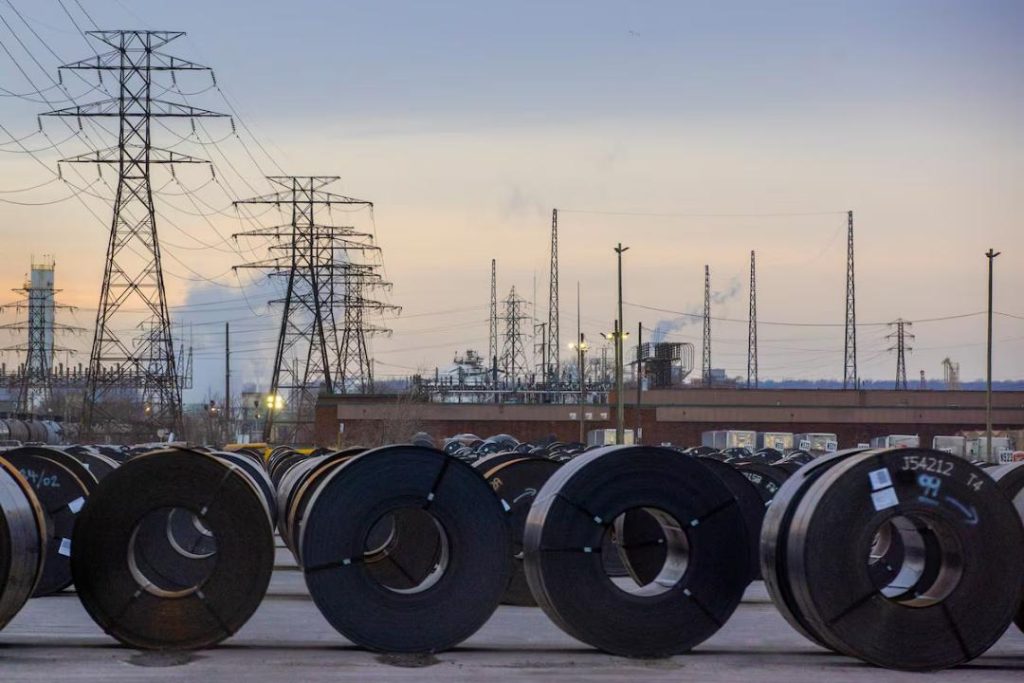
US Tariffs Hit Canada’s Steel & Aluminum Industry, Job Cuts Begin
The ongoing trade tensions between the United States and Canada have taken a devastating toll on Canada’s steel and aluminum industry, with job cuts already underway. At least 200 workers have been affected, according to Marty Warren, National Director of the United Steelworkers. The industry is reeling from the impact of US tariffs on steel and aluminum, which were imposed in June 2018. The tariffs, which were initially set at 25% for steel and 10% for aluminum, have led to a significant decline in Canadian exports to the US.
One of the latest victims of the tariffs is the Canada Metal Processing Group, which has cut 140 jobs due to the “threat of incoming tariffs.” The company, which operates several facilities in Ontario and Quebec, has been forced to reduce its workforce in response to the tariffs, which have made it increasingly difficult for the company to compete in the US market.
The job cuts are just the tip of the iceberg, as the tariffs are expected to have a ripple effect throughout the industry. Economists warn that the tariffs could lead to greater fallout ahead, including further job losses and a decline in economic output.
The tariffs were imposed by the US in response to what it claimed was a national security risk posed by Canadian steel and aluminum. However, many experts argue that the tariffs are simply a protectionist measure designed to protect the US steel and aluminum industries from foreign competition.
The impact of the tariffs on the Canadian steel and aluminum industry has been devastating. According to a report by the Conference Board of Canada, the tariffs have led to a decline in Canadian steel and aluminum exports to the US of over 40%. This has resulted in a significant loss of revenue for Canadian steel and aluminum producers, which has had a ripple effect throughout the industry.
The job cuts at the Canada Metal Processing Group are just the latest in a series of layoffs that have been announced in recent months. In February, ArcelorMittal Dofasco, a leading steel producer in Canada, announced that it would be cutting 250 jobs due to the impact of the tariffs. Similarly, Evraz North America, a leading steel producer in the US and Canada, announced that it would be cutting 150 jobs due to the tariffs.
The impact of the tariffs is not limited to the steel and aluminum industry. The tariffs have also had a significant impact on other industries that rely on steel and aluminum, including the automotive and construction industries.
The automotive industry, in particular, has been hard hit by the tariffs. Many automotive manufacturers, including General Motors and Ford, have been forced to absorb the cost of the tariffs, which has resulted in increased production costs and reduced profit margins.
The construction industry has also been affected by the tariffs. Many construction companies, including those that specialize in building steel-framed structures, have been forced to pay higher prices for steel due to the tariffs. This has resulted in increased construction costs and reduced profit margins for construction companies.
Despite the devastating impact of the tariffs on the Canadian steel and aluminum industry, the Canadian government has been reluctant to take decisive action to challenge the tariffs. In June 2018, the Canadian government imposed retaliatory tariffs on US steel and aluminum, but these tariffs have had little impact on the industry.
The lack of action by the Canadian government has been criticized by many experts, who argue that the government has failed to take adequate steps to protect the Canadian steel and aluminum industry. In a recent statement, Marty Warren, National Director of the United Steelworkers, criticized the government for its inaction, saying that it has “failed to stand up for Canadian workers and industries.”
The situation is expected to worsen in the coming months, as the US is set to impose additional tariffs on steel and aluminum on April 2. These tariffs, which will increase the rate of the existing tariffs to 30% for steel and 20% for aluminum, are expected to have a devastating impact on the Canadian steel and aluminum industry.
In conclusion, the US tariffs on steel and aluminum have had a devastating impact on the Canadian steel and aluminum industry, with job cuts already underway. The industry is expected to continue to decline in the coming months, as the US imposes additional tariffs on steel and aluminum. The Canadian government must take decisive action to protect the industry and its workers, including imposing retaliatory tariffs and providing financial support to affected companies.






